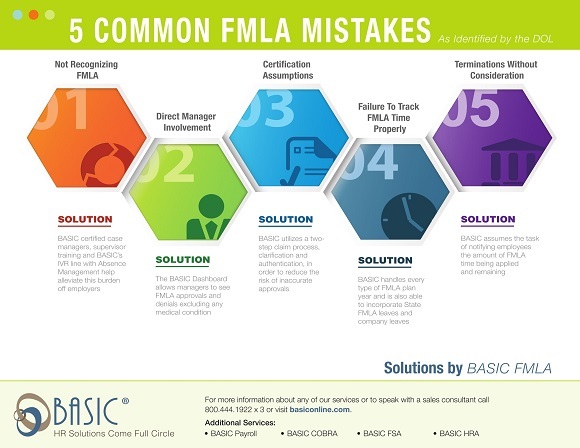Certification Errors: The Third of Five Common FMLA Mistakes
Huge issues can arise when FMLA certification mistakes are made. Due to the complicated nature of the FMLA, it’s easy to make these mistakes and can be extremely hard to fix them. Some of the most common certification mistakes include: approving an employee’s leave when their illness is not actually covered under the FMLA, approving FMLA leave for family members that aren’t covered, and making assumptions about an employee’s chronic health condition. These mistakes can result in a plethora of predicaments which can be extremely damaging.
Approving an employee’s FMLA leave for an ailment that isn’t covered under the FMLA can open the door to an abuse of leave rights. For instance, if an employer were to approve a request for intermittent FMLA leave for an employee that was merely suffering from the common cold, that employee could potentially use their approved leave to take time off of work at their leisure. Additionally, FMLA only applies for the care of certain family members. Approvals of leave requests for unapproved family members, such as cousins or aunts that are not or were not standing in loco parentis*, could result in situations similar to those caused by approvals for unapproved illnesses. Of course, not every inaccurate approval will result in an abuse of rights, but being familiar with applicable family members and conditions for qualified FMLA claim will decrease the chances of abuse occurring dramatically.

One requirement of the FMLA for those with chronic health conditions such as diabetes, migraines or asthma, is they must see their doctor at least twice in the prior twelve months to continue to be approved for intermittent FMLA leave. Many employers may assume their employees have seen their doctor at least twice in the past year, but that can be a dangerous assumption. Traditionally, employers are allowed to recertify employees every six months; however, in certain circumstances, they may recertify after 30 days. Recertification will uncover if an employee hasn’t seen their doctor as frequently as is required, or if there has been a change in the employee’s frequency or duration as it pertains to the employee’s approved FMLA. Without the necessary information, it is impossible for an employer to make the correct judgment when considering a leave request, or uncovering possible fraudulent absences.
At BASIC, our FMLA solution utilizes a two-step claim process – which includes clarification and authentication – in order to reduce the risk of inaccurate approvals. We know how difficult it can be to understand and comply with the complex rules laid out by the DOL; we can help navigate those details, keeping employers compliant and from having to deal with FMLA missteps.
To request a proposal on BASIC’s FMLA services, click here!
To learn more about our FMLA administration, click here!
* IRS definition of In Loco Parentis – https://www.dol.gov/whd/regs/compliance/whdfs28C.pdf